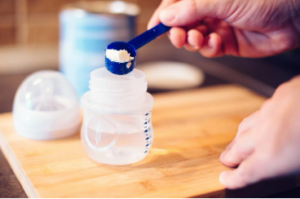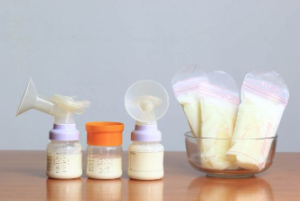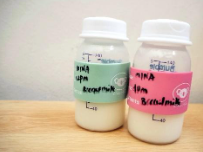
When I first became a parent, I was overwhelmed by the amount of new information I needed to keep track of. One of the most common concerns I had, especially in those sleepless early weeks, was feeding my baby. I quickly learned that formula feeding comes with a whole set of guidelines to ensure your baby stays healthy, but the one question that seemed to pop up more than any other was: How long can formula stay in the fridge?
It’s such a simple question, but it carries a lot of weight when you’re trying to navigate the ins and outs of baby care. You don’t want to waste formula, but you also don’t want to risk giving your baby something that’s not safe. If you’ve found yourself wondering the same thing, you’re not alone. In this post, I’ll break down how long formula can stay in the fridge, share some best practices for storage, and give you tips to make your life a little easier.
Why Formula Storage Is So Important
Before we get into specifics, let’s take a moment to understand why proper storage is so critical. Infant formula is a food product, and like any food, it can spoil if not handled correctly. Formula that’s not stored properly can become a breeding ground for harmful bacteria, which can lead to foodborne illness for your little one.
When I first started formula feeding, I thought it was just about putting the bottle in the fridge and forgetting about it. But after a few weeks, I realized it was so much more than that. I quickly learned how easy it is to make mistakes—whether it’s forgetting to refrigerate leftover formula or not realizing how long it can safely stay in the fridge. Trust me, once you understand the guidelines and set a system for storing formula, it’ll make feeding time so much less stressful for you.

The Basic Rule: Formula Can Be Stored for 24-48 Hours
When it comes to formula, the general recommendation is that you can store prepared formula in the fridge for up to 24 hours. This applies to any formula that’s been mixed from powder or concentrate. So, if you’ve just prepared a bottle and it’s sitting in the fridge, you’ve got a 24-hour window to use it.
However, there are a few important caveats to this:
Freshness Counts: The 24-hour guideline is for formula that has been kept in the fridge right after preparation. It’s important not to leave formula sitting out at room temperature for more than an hour. Formula that has been at room temperature for too long can develop bacteria that thrive in warm environments.
Powdered Formula: If you’re using powdered formula, once the powder has been mixed with water, it should be used within 24 hours. If the powder is still in its dry form and stored in an airtight container, it can remain on the shelf for a longer period. But once you prepare it, remember—24 hours in the fridge.
Pre-Mixed Formula: For pre-mixed formula, you should use it within 48 hours if it’s been refrigerated. This is because the formula has already been processed, and its shelf life is slightly longer than that of powder mixed with water.
What Happens If Formula Sits Too Long?
I have to admit, that I have also had some moments where I prepared formula in bulk, thinking I could cut down on time and just grab a bottle when I needed it. But then after some days, I started to wonder if the bottles of formula were sitting in the fridge for too long? Naturally, I started to panic. Was the formula still safe? Had I missed the window?! Is this going to affect my baby?! I was definitely worried after seeing that.
Here’s what you need to know: If formula has been in the fridge for longer than 24 hours, it’s better to toss it. Formula that’s been left too long can become a breeding ground for bacteria, even in the fridge. I once made the mistake of offering a bottle that had been in the fridge for 36 hours, and I could tell right away that it had gone bad. My baby wasn’t having it. They made an unpleasant face, and I knew something was off. Always trust your instincts—and when in doubt, toss it out.
Tips for Storing Formula Safely
As a new parent, I always thought and was often worried that I was going to mess something up with my baby. But once I implemented a few simple steps to organize, it became second nature, and formula storage became one less thing to stress over. I highly recommend that you should implement these steps too!

- Label Bottles with Time and Date
This simple trick saved me so many headaches. As soon as I’d make a bottle, I’d label it with the time and date it was prepared. This way, I knew exactly how long it had been in the fridge, and I never had to guess. Plus, it helps avoid the risk of forgetting about a bottle that’s been in there for too long. I still use this method today for all sorts of baby-related items!
- Keep Bottles Cold Immediately
After you prepare formula, make sure to refrigerate it immediately—within an hour. If you let formula sit out too long before refrigerating, you increase the chances of harmful bacteria developing. I found it helpful to keep a designated spot in the fridge where I’d always place fresh bottles, so I could quickly access them.
- Don’t Reheat More Than Once
While it’s okay to warm up formula, never reheat formula that’s been warmed previously. Once formula has been heated and then cooled down, it should not be reheated again because it can promote bacterial growth.
I remember the first time I reheated a bottle of formula, thinking it was fine to just pop it back in the microwave for a quick warm-up. After learning the guidelines, I realized I should have tossed that bottle and used a fresh one instead. Lesson learned! Haha
- Use the Fridge’s Coldest Spot
When storing formula in the fridge, try to place it in the coldest spot—usually near the back of the fridge. This helps maintain a consistent, safe temperature for the formula. The door of the fridge tends to be the warmest area, so avoid storing formula there.
What About Formula Left Out of the Fridge?
I remember a moment of panic when I realized I’d forgotten to put a bottle in the fridge after a feeding. What happens if formula has been left out of the fridge for too long? The general rule is that formula should not sit out at room temperature for more than 1 hour. If it’s been out for longer than that, it’s best to throw it away.
This can feel wasteful at times, but when it comes to your baby’s health, it’s always better to be safe. I’ve had to toss a bottle or two, but now I know it’s part of the process.
In Conclusion: Formula Safety First
When you want to feed your baby formula it doesn’t have to be a big ordeal like I had. You just have to understand how formula can stay in the fridge and follow some simple storage guidelines, you should feel confident that you’re providing healthy, nutritious and wholesome meals for your baby.
Remember: formula that’s been properly stored in the fridge should be used within 24-48 hours. And when in doubt, it’s always better to toss it than risk giving your baby something unsafe.
Trust me—once you’ve developed a routine, storing formula becomes second nature. And with that peace of mind, you can focus on what matters most, which is the time and love spent with your baby, knowing you’re doing everything you can to keep them safe and healthy.
Got any other formula feeding tips? I’d love to hear how you store your baby’s formula! Share your experiences in the comments below.
